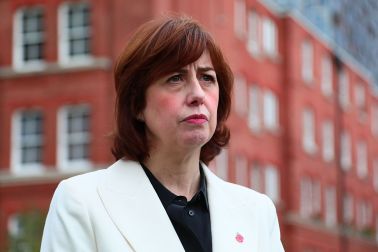Who are all these people who keep being photographed on Bournemouth beach and elsewhere, frolicking in the midday sun? None of them, obviously, work for the Health and Safety Executive (HSE) or the TUC. None of them can possibly be members of the Unite union, nor Unison, nor the GMB.
It is little wonder that UK productivity is on the floor – and falling in the public sector
How can I be so sure? Because if they were, they would be surely sheltering indoors, in the shade, with the fan on and their feet immersed in a bucket of cold water. All these organisations have been lobbying the government for a maximum working temperature.
While the HSE hasn’t yet put a figure on it, it wants employers to be forced to carry out ‘heat assessments’ before allowing their employees to carry on working on hot days. The TUC and many unions, however, have suggested a maximum working temperature of 27 degrees Celsius for strenuous work and 30 degrees Celsius for sedentary work, saying it is dangerous for the health or workers to be expected to do anything in higher temperatures. Once the threshold is reached, they say, workers should be allowed to clock off and go home – or quite likely to the pub or the beach.
If Singapore applied the same rules that the TUC is demanding, no one there would be allowed to do any manual work, ever – the average daily maximum temperature is over 27 Celsius every month of the year. Even office workers would only be allowed to put in two months’ work per year – in December and January, when the average maximum falls to 29 Celsius. In Dubai, office workers would be allowed to put in four months’ work a year and manual workers three months. Yet these places are among the wealthiest societies on Earth, so evidently people do manage to get some work done there.
The warm weather has become the latest front in workshy Britain. We don’t want to have to go into the office, don’t want to work more than four days a week, don’t want to work if we are feeling a bit down in the mouth and now, it seems, don’t want to work on warm sunny days, either.
The public sector unions will presumably be hoping that we won’t notice the contradiction between their demands. After the pandemic, the First Division Association (FDA), which represents senior civil servants, demanded the right to work from abroad for part of the year – which in practice almost certainly means in warmer climates than Britain, on Greek beaches or the terrace of Tuscan farmhouses. And yet when Tuscan temperatures come to Britain, then it’s all out, brothers – it’s too hot to be expected to put in any effort.
It is little wonder that UK productivity is on the floor – and falling in the public sector. The pandemic, which brought months of furlough for many workers, has left in its wake a shift in attitudes towards work. Too many workers are looking for any old excuse to clock off and recreate those long months of leisure which they so fondly remember from 2020 and 2021. The demand for a maximum working temperature is just the latest manifestation of this.








Comments